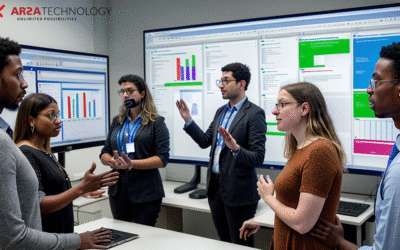Introduction: Overcoming Scalability Challenges in the Accessibility Industry
The digital landscape is rapidly evolving, and with it, the imperative for inclusive design. For the accessibility industry, providing seamless, intuitive experiences for all users is not just a moral obligation but a critical business differentiator. Mobile applications, in particular, have become vital conduits for information and interaction, making in-app voice guidance an indispensable feature for users with visual impairments, reading difficulties, or those who prefer auditory learning. However, the journey to implementing robust, high-quality voice guidance is often fraught with a significant hurdle: scalability challenges.
As an application grows, so does the demand for its underlying services. For voice guidance, this means handling an increasing volume of text-to-speech (TTS) requests, maintaining low latency, ensuring natural-sounding voices across diverse content, and supporting multiple languages without compromising performance or incurring exorbitant costs. Many organizations struggle to scale their voice synthesis capabilities efficiently, leading to degraded user experiences, increased operational overheads, and missed opportunities for market expansion. This article delves into how ARSA Technology’s Text-to-Speech API addresses these critical scalability concerns, offering a powerful, enterprise-grade solution for delivering superior in-app voice guidance.
The Growing Imperative for Accessible In-App Voice Guidance
Accessibility is no longer an afterthought; it’s a foundational element of successful product development. For mobile applications, voice guidance transforms the user experience, making apps navigable and understandable for a broader audience. From reading out menu options and form fields to providing real-time instructions and alerts, high-quality voice synthesis empowers users to interact with digital content independently and effectively.
The demand for such features is surging, driven by an aging global population, increased awareness of diverse user needs, and stringent regulatory requirements. Developers and product managers in the accessibility sector are actively seeking solutions that can not only meet current demands but also scale effortlessly to accommodate future growth and evolving user expectations. The challenge lies in finding a voice synthesis solution that is both powerful and flexible, capable of delivering natural, human-like speech at scale, without introducing performance bottlenecks or complex infrastructure management.
Understanding the Scalability Hurdle in Voice Synthesis
Implementing in-app voice guidance involves converting written text into spoken audio. While conceptually straightforward, doing this at scale presents several technical and operational complexities:
- Resource Intensity: High-quality voice synthesis, especially for natural-sounding voices, is computationally intensive. Processing thousands or millions of concurrent requests can quickly overwhelm local servers or less robust API infrastructures.
- Latency: For an engaging user experience, voice guidance must be delivered with minimal delay. High latency due to processing bottlenecks can frustrate users and undermine the app’s usability.
- Maintenance and Updates: Managing on-premise TTS engines requires continuous maintenance, software updates, and hardware upgrades, diverting valuable developer resources from core product innovation.
- Global Reach: Supporting multiple languages and regional accents adds another layer of complexity, requiring extensive linguistic models and robust infrastructure to serve a global user base efficiently.
- Cost Management: Scaling infrastructure to meet peak demands can be prohibitively expensive, leading to underutilized resources during off-peak times or performance issues during surges.
These challenges highlight the need for a cloud-based, API-driven solution that abstracts away the underlying complexities, allowing developers to focus on building accessible features rather than managing infrastructure.
ARSA Technology’s Text-to-Speech API: A Scalable Solution
ARSA Technology understands the critical need for scalable, high-performance voice synthesis in the accessibility industry. Our Text-to-Speech API is engineered from the ground up to address these challenges, providing a robust, cloud-native platform that ensures reliable and efficient voice guidance for mobile applications of any scale. By leveraging advanced AI and machine learning models, our API delivers natural-sounding speech with exceptional clarity and emotional nuance, transforming text into engaging audio experiences.
Our API’s architecture is designed for high availability and low latency, capable of handling vast volumes of concurrent requests without degradation in performance. This means your mobile application can provide instant, high-quality voice guidance to a rapidly growing user base, anywhere in the world. To learn more about how our solution fits into our full suite of AI APIs, visit our product page. For a deeper dive into the specific capabilities of our Text-to-Speech API, you can explore its features directly: Text-to-Speech API.
Key Performance Benchmarks for Enterprise-Grade TTS
When evaluating a Text-to-Speech API for enterprise-level accessibility solutions, several performance benchmarks are paramount:
- Speed and Responsiveness: The API must convert text to speech almost instantaneously. ARSA’s API is optimized for speed, ensuring that voice guidance is delivered in real-time, maintaining a fluid and natural interaction flow within your application.
- Accuracy and Naturalness: Beyond just speaking words, the API must convey them naturally, with appropriate intonation, rhythm, and pronunciation. Our advanced models are trained on vast datasets to produce highly human-like voices that enhance comprehension and user engagement.
- Reliability and Uptime: For critical accessibility features, consistent availability is non-negotiable. ARSA Technology’s API boasts industry-leading uptime, backed by a resilient cloud infrastructure, ensuring your voice guidance is always available when users need it most.
- Multilingual Support: To serve a global audience, the API must support a wide array of languages and dialects. Our Text-to-Speech API offers extensive multilingual capabilities, allowing you to expand your application’s reach and provide localized voice experiences without needing separate integrations or complex language management systems. This global capability is a cornerstone of true scalability.
Beyond Basic Synthesis: Advanced Features for Enhanced Accessibility
While performance is key, the richness of features directly impacts the quality of the user experience. ARSA Technology’s Text-to-Speech API goes beyond basic text conversion, offering advanced capabilities that empower developers to create truly immersive and accessible voice guidance:
- Customizable Voices: Choose from a diverse range of voices, genders, and speaking styles to match your brand’s identity or the specific context of your application. This customization ensures a consistent and pleasant auditory experience.
- Emotional Nuance and Expressiveness: Our API can inject emotional tones into the synthesized speech, making interactions more engaging and human-like. This is particularly valuable for conveying alerts, instructions, or narrative content with appropriate emphasis.
- Pitch and Speed Control: Developers can fine-tune the pitch and speaking rate of the generated voice, allowing for personalized experiences that cater to individual user preferences or specific accessibility requirements.
- Pronunciation Lexicons: For specialized terminology, brand names, or unique proper nouns, our API allows for custom pronunciation rules, ensuring accuracy and consistency in all spoken content.
To hear the quality and flexibility of our voice synthesis, try the Text-to-Speech API. This interactive demo allows you to experience firsthand the naturalness and control our API offers.
Driving Business Value with ARSA’s Text-to-Speech API
Adopting ARSA Technology’s Text-to-Speech API translates directly into tangible business benefits, helping organizations in the accessibility industry achieve their strategic goals:
- Cost Efficiency and Reduced TCO: By offloading the computational burden of voice synthesis to our cloud infrastructure, you eliminate the need for expensive hardware, maintenance, and specialized personnel. This significantly reduces your total cost of ownership and allows your team to focus on core product development.
- Enhanced User Experience and Retention: Superior, scalable voice guidance leads to higher user satisfaction, better engagement, and increased app retention. A truly accessible app is a more valuable app.
- Accelerated Time-to-Market: Our API’s ease of integration and comprehensive documentation enable developers to quickly implement sophisticated voice features, shortening development cycles and bringing accessible products to market faster.
- Global Market Expansion: With robust multilingual support, your application can seamlessly reach new international markets, catering to diverse linguistic needs without re-engineering your voice guidance system.
- Competitive Advantage: Differentiate your mobile application by offering a consistently high-quality, scalable, and customizable voice guidance experience that outperforms competitors relying on less sophisticated or less reliable solutions.
- Future-Proofing Your Investment: As AI technology evolves, ARSA Technology continuously updates and improves its API, ensuring your application benefits from the latest advancements in voice synthesis without requiring any effort on your part.
Seamless Integration and Developer Support
Integrating ARSA Technology’s Text-to-Speech API into your existing mobile application is designed to be straightforward, allowing your development team to leverage powerful voice synthesis capabilities without extensive re-architecture. We provide clear, comprehensive conceptual guides that focus on how to integrate the API into your application’s workflow, emphasizing the logical steps and expected outcomes rather than low-level code. Our documentation highlights best practices for optimizing performance and ensuring a smooth user experience.
Beyond the technical documentation, ARSA Technology is committed to providing exceptional developer support. Our team of experts is available to assist with any questions, from initial integration strategies to optimizing performance for specific use cases. For any questions or integration assistance, contact our developer support team. We are dedicated to ensuring your success in building highly accessible and scalable voice-enabled applications.
Conclusion: Your Next Step Towards a Solution
Scalability challenges in delivering in-app voice guidance for mobile applications in the accessibility industry are real, but they are not insurmountable. ARSA Technology’s Text-to-Speech API offers a powerful, reliable, and highly scalable solution designed to meet the demands of modern, inclusive applications. By choosing our API, you gain access to state-of-the-art voice synthesis that ensures natural, responsive, and customizable auditory experiences for your users, while simultaneously optimizing your development efforts and operational costs.
Embrace the future of accessibility with a partner committed to innovation and performance. Elevate your mobile application’s voice guidance, expand your global reach, and provide an unparalleled user experience that sets your product apart.
See Why ARSA is the Right Choice for Your Business.
Don’t just take our word for it. Schedule a free, no-obligation consultation with our API experts to discuss your specific needs and get a personalized performance and ROI analysis.







